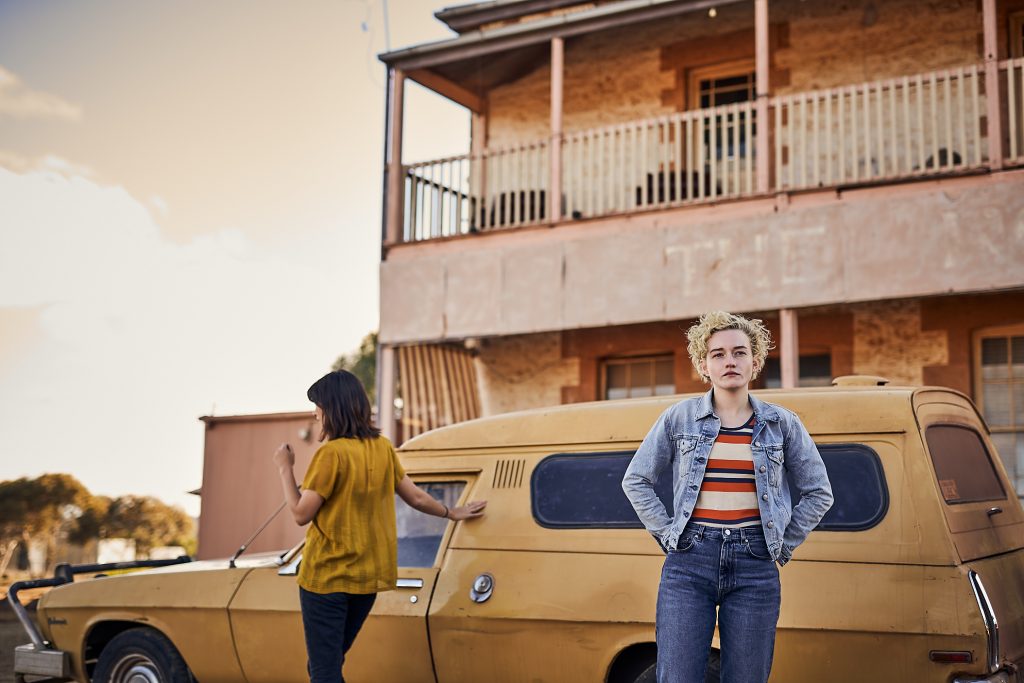Reviews include Deadpool & Wolverine, Doubles, and Mountain Queen: The Summits of Lhakpa Sherpa.
TFCA Friday: Week of Oct. 6
October 6, 2023

Welcome to TFCA Friday, a weekly round-up of film reviews and articles by TFCA members.
In Release this Week!
https://youtu.be/nz5oQtdCrVI
Black Barbie (dir. Lagueria Davis)
“The film exhibits symptoms of having too many cooks in the kitchen,” admits Pat Mullen at POV Magazine. “Black Barbie is sharp, joyous cultural commentary when Davis keeps he focus trained on Beulah Mae Mitchell, Kitty Black Perkins, and other related parties discuss the doll’s genesis. But once it expands the circle to peripheral talking heads that range from actress Gabourey Sidibe (who’s actually a highlight of the film) to “public historians” designers, and influencer-style people, Black Barbie becomes burdened by competing agenda. People in Black Barbie often use Barbie as a stepping stone toward discussing something else.”
The Exorcist: Believer (dir. David Gordon Green)
“The Exorcist: Believer – twice the possession, twice the stupidity,” sighs Gilbert Seah at Afro Toronto.
“It’s a film so past its prime that it warrants a best-before date stamped on the poster,” groans Thom Ernst at Original Cin. “Green and his frequent writing partner — a curiously unfunny Danny McBride — aren’t just attempting to reboot a classic bit of cinema and one of the few horror films to earn critical legitimacy and even an Oscar nomination. They’re aiming for a reboot of an entire faith-based community… There are many reasons why The Exorcist worked and still does, and why The Exorcist: Believer doesn’t and never will. But to explore the difference between the films too profoundly would be to legitimize Green’s film as a worthy successor to William Friedkin’s masterpiece. It isn’t.”
“If the power of Christ compels you to watch a new Exorcist movie, then Godspeed and God bless,” advises Barry Hertz at The Globe and Mail. “Because even though the latest horror-franchise resurrection from intellectual-property gravedigger David Gordon Green (Halloween) isn’t sullying a spotless brand, The Exorcist: Believer still reeks of sulphur-scented soullessness. The moviegoing body may be willing, but the cinematic flesh is weak.” Hertz also interviews Green, who illuminates why this spin in the ECU might seem off: “With The Exorcist, I just don’t know those movies very well,” Green tells Hertz. “I have an appreciation that they exist, particularly Exorcist II: The Heretic, which is ballsy. But I just didn’t acknowledge it, if that makes sense.”
Joan Baez: I Am a Noise (dir. Karen O’Connor, Miri Navasky and Maeve O’Boyle)
“Joan Baez I Am a Noise concentrates on the acclaimed singer’s difficult relationships with her family. We find out that Joan had two sisters–the elder, Pauline, avoided competition by becoming a “silent” weaver while the younger, Mimi, fought with her since both were superb folk singers—and, of course, a mother, Joan (Sr.) and a father, Albert, a physicist and co-inventor of the X-ray microscope,” says Marc Glassman at Classical FM. “As she grew older, Mimi, the beauty in the family, remembered that their father once kissed her passionately on the lips; soon after, Joan began to recall similar episodes. A good part of the film deals with Mimi and Joan’s possibly “false” memories—though they could be true.”
“Baez, 82, recently retired from touring, explains in this achingly honest doc by Karen O’Connor, Miri Navasky and Maeve O’Boyle why saintly labels don’t apply to her: ‘There’s a powerful lot of anger lurking just under my big smile,’” writes Peter Howell at the Toronto Star. “Interviews and archival performances are supplemented by Baez’s many personal letters, which are animated for the screen. Among the many revelations are lifelong anxiety issues, paternal abuse allegations and the bittersweet truth that her famous love affair with Bob Dylan really did break her heart.”
“This visual memoir paints a picture of a woman who, while leading a rich professional life, was plagued by personal demons. She began therapy at the age of 16, and, at various times of her life, continued to suffer from depression, insomnia, stomach aches, panic attacks, anxiety and difficulty with intimate relationships,” notes Liam Lacey at Original Cin. “‘I think she was a very happy girl —but something was bothering her, her whole life,’ says her mother in an archival interview.’”
Miranda’s Victim (dir. Michelle Tanner)
“Miranda’s Victim is a tense and compelling courtroom drama brimming with raw emotions, a drama that also reflects the mores and social behaviour of the times,” says Gilbert Seah at Afro Toronto.
Race to the Summit (dir. Nicholas de Taranto and Götz Werner)
“This great media and mountaineering event of two climbers racing to the summit translates to awesome documentary filmmaking,” observes Gilbert Seah at Afro Toronto.
The Royal Hotel (dir. Kitty Green)
“Just as the strict religious sect in the Miriam Toews’ novel/Sarah Polley film Women Talking helps amplify issues around gender dynamics, so too the isolated setting of The Royal Hotel — a setting soaked in testosterone and alcohol — casts such issues in high relief,” says Liz Braun at Original Cin. “There’s nothing here you haven’t witnessed before in the way of unpleasant male behaviour, which ranges in the movie from annoying to creepy to downright threatening. That godforsaken locale, however, really raises the stakes, and what’s somewhat ordinary often becomes terrifying. The atmosphere carefully built as the story unfolds is suffocating.”
“The women are outnumbered but not outsmarted in this nightmare of male toxicity by Aussie writer/director Kitty Green (The Assistant), based on an all-too-true story. Broke backpackers Hanna (Julia Garner) and Liv (Jessica Henwick) are told to expect ‘a little male attention’ when they sign on for live-in bar jobs at the title hellhole in an Outback mining town, but the warning is dangerously understated,” writes Peter Howell at the Toronto Star. “It’s an unnerving and disturbing watch with a resolution that will send rising pulses further skywards.”
“Well done though quite a gruesome grind before the girls come out victorious,” notes Gilbert Seah at Afro Toronto.
“The tidy genius of Green’s film is that she manages to keep the tension at a constant state of low-boil simmer,” observes Barry Hertz at The Globe and Mail. “Like Hanna, the audience is primed to keep one eye on the background of the action, anxiously aware that the bar’s male customers might explode into primal rage at any moment. One drink order bumbled, one flirtation ignored, one wrong word said, and the ‘harmless game’ that the men tell themselves they are playing quickly reveals its true, hateful nature.”
“New girls at the bar are advertised outside as ‘Fresh Meat’ and that’s exactly how they’re treated. They’re disgusted by the local patrons, male and female, who drink a lot, act out, strip, dance on the bar, and harass the Canadians,” writes Anne Brodie at What She Said. “The girls keep their cool and begin to relax, as we do for them, smiling and fitting in when, like whack-a-mole, one after another male with boundary issues gets a notion. Things take a scary, then very bad turn in this survival thriller.”
She Came to Me (dir. Rebecca Miller)
“Finally, a film that reveals the secret sex lives of tugboat captains,” toots Barry Hertz at The Globe and Mail. “The entire affair, or affairs rather, are also enlivened by sparkling performances from a stacked cast. Dinklage by this point in his career has the grumpy-smart-aleck thing nailed down cold, while Tomei uses a deft, sensitive touch to anchor a sometimes overly complex and exceptionally strange role. (She also might make you want to seek out your city’s nearest port.) And Hathaway gets to once again, after her turn in last year’s Armageddon Time, try her very best to play a Jewish woman despite mispronouncing the word ‘kreplach’ (as in the traditional Jewish soup dumpling) approximately five different ways in the span of 35 seconds.”
“With an A-list cast, She Came to Me at least holds your attention, like an early Woody Allen portrait of New York neurotics, though lacking Allen’s pomposity-deflating punchlines,” writes Liam Lacey at Original Cin. “Without a firm anchor on their shifting, uncertain characters, the actors perform: Dinklage furrows his brow and broods, Hathaway widens her eyes and preens, and Tomei, who comes off the best, exudes a loose-bodied feral energy. Collectively though, their interactions have a theatrical brittleness which never feels spontaneous or perhaps as funny as they’re intended to be.”
“Rebecca Miller has come up with a plot that somewhat resembles a screwball comedy from the Thirties. It’s quite crazy and barely makes sense. But it’s full of love and humour and drama,” says Marc Glassman at Classical FM. “The performances throughout the film are fine, particularly by the young couple, played by Harlow Jean and Evan Ellison, who give charming renditions of what it’s like to be so innocent and in love. Kudos to Anne Hathaway for taking off her clothes—and her psychiatrist mentality—in a key scene. Naturally, Dinklage and Tomei—mismatched—do their best. And let’s not forget the great Joanna Kulig, a Polish star, whose performance in the award-winning film Cold War was revelatory and is terrific in a character role here.”
“Director Rebecca Miller’s film is touted as a romantic comedy but it feels far from it. In a good way,” says Gilbert Seah at Afro Toronto. “She Came to Me is a quirky, often hilarious look at two families, each with problems almost unsurmountable, for a variety of reasons including past failures and assholism (a word like this does not but should exist).”
Strange Way of Life (dir. Pedro Almodóvar)
“Even in its short running time, Strange Way of Life is in line with all the Almodóvar values, and feels like a satisfying short story,” says Karen Gordon at Original Cin. “Strange Way of Life, named after a song by the great Caetano Veloso, is less about the way the men relate to each other, and more about where their choices have brought them. Almodóvar shot the film in parts of Spain, where Spaghetti Westerns were filmed in the ‘60s and ‘70s, but his reference points aren’t those films. He says he was inspired by American movie westerns, and, the look, the feel of the movie is inspired by them.”
At The Globe and Mail, Barry Hertz chats with Pedro Almodóvar about westerns, cowboys, sex, and the laws of desire. “[I]t’s one of the best part of our lives, desire. The best part of human nature, so to celebrate that is very important,” Almodóvar tells Hertz. “In the case of Ira Sachs, they got from the [Motion Picture Association of America] a NC-17 rating, which means ‘be careful.’ I have a long relationship with NC-17, back to Tie Me Up! Tie Me Down! When I was working on that with Miramax, the MPAA wanted to give us an X rating, so we took them to court with the makers of Henry: Portrait of a Serial Killer and Henry & June. The court said, you’re right, neither of the three movies are pornographic. But they have a ‘nature’ about them. So they invented a new rating, the NC-17. But what the rating says to me today is that it still represents a stigma.”
“But this queer western, unlike Ang Lee’s Brokeback Mountain, is devoid of emotion and comes across as a very queer (here meaning odd) exercise,” admits Gilbert Seah at Afro Toronto. “One wonders what the point of this gay film is.”
“Pedro Aldomóvar’s queer western ‘answer’ to Brokeback Mountain, a movie he almost directed, makes terrific lovers and fighters out of Ethan Hawke and Pedro Pascal. Jake and Silva are two former hired guns who were once also a secret couple 25 years ago, but times have changed,” says Peter Howell at the Toronto Star. “Jake, now the sheriff of desert town Bitter Creek, has official business that conflicts with the joy of seeing Silva again, when his old flame suddenly rides back into his life. This first release from fashion label Saint Laurent is as gorgeous as you’d expect — ever see a cowboy with designer undies? At a mere 31 minutes, though, it also raises a question: Couldn’t this have been longer? I wanted more of this story and these guys.”
“Decades before, on a boozy jaunt in wine country, Jake and Silva, played in their younger years by José Condessa and Jason Fernández, have an effervescent encounter. The younger actors, decked out in extraordinary costumes by Saint Laurent and Anthony Vaccarello, attack each other with passionate fury as wine pours out of the barrels and they become intoxicated by far more than the fermenting juices. Few Almodóvar films have captured such heat as Condessa and Fernández soak each other up,” writes Pat Mullen at That Shelf. “If there’s a fault to Strange Way of Life, it’s that Hawke and Pascal simply don’t ignite the same fireworks that their scorching co-stars do. But any cooling has its significance. The older men are hardened by the codes of the westerner’s life that’s kept them apart.”
When Evil Lurks (dir. Demian Rugna)
“When Evil Lurks builds up extremely well but suffers a slight letdown at the end. Still, this horror flick has plenty of innovations and scares to offer,” writes Gilbert Seah at Afro Toronto.
Your Friend, Memphis (dir. David Zucker)
:At one point in the film, Memphis tells Zucker, ‘You can’t have story without conflict. Story is conflict.’ Memphis seems to put too much stock in this philosophy. His story is all conflict,” writes Pat Mullen at POV Magazine. “He’s at odds with everyone and angry at a system that doesn’t offer him proper services. As Christine notes, Memphis doesn’t qualify as disabled under Texas’s broken standards even though the physical traits of cerebral palsy offer physical restrictions to some jobs and invite hiring bias at others. But Memphis’s work ethic, or lack thereof, doesn’t help. Your Friend, Memphis straddles a difficult challenge of asking audiences to sympathize with a character to whom sympathy doesn’t come easily.”
TV Talk/Series Stuff: Low-key Loki
At The Globe and Mail, Barry Hertz offers some reasons why you should maybe bother with the return of Loki: “Partly because it’s nice to see Hiddleston and Wilson getting paid in (presumably) dump-trucks full of cash. Partly because it’s fascinating to watch Disney not care a whit about the ugly headlines following the arrest of Loki co-star – and future Avengers supervillain – Jonathan Majors,” writes Hertz. “But you can opt out now. Save yourself the energy. And, as a character on the series might say, save yourself the time.”



